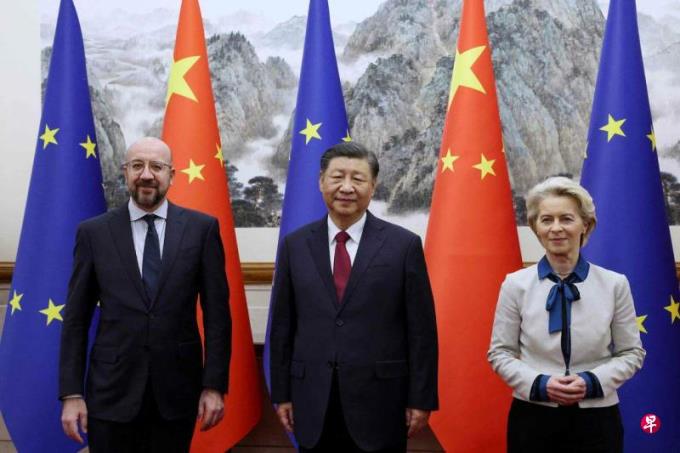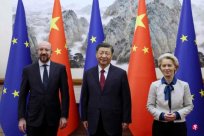
China mistakenly believes that as long as it is done in the United States, everything can be done.As everyone knows, this strategy of pro -American and European Europe not only stimulates the United States to continuously increase the price, but also seriously irritate the European Union.To achieve independent development, only the enlightened political reforms have been implemented internally, including the re -introduction of the principle of socialism; the foreign policy is adjusted to the international community.Among them, the reconstruction of China -Europe relations should become the top priority of China's diplomacy.
Europe is the birthplace of modernization, and it is also the birthplace of socialist thought with equality as the core value.Europe has three important significance to China in the post -developed country.
First of all, Europe has always been one of China's largest export markets and technical sources, and its importance to China's economic development is not inferior to the United States.Taking the most cutting -end aerospace products as an example, the European Union and the United States are almost divided into autumn in high -tech imports in China.Secondly, strategically, there is no conflict between European and China. The European Union's multi -polarized diplomatic concept and practice, which is essential for China to realize the peaceful rise of the United States after the Cold War.
Furthermore, in terms of ideology and system, European democratic socialism, welfare countries, and unified markets, the transformation of China's development model from extensive industrialization to integrated industrialization, and finally from relying on foreign technology and marketsDepending on development, it is of great significance to switch to the independent development of the domestic market, compatible with free markets and socialist principles.
The end of the Cold War and the disintegration of the Soviet Union means that China's strategic value to the West has dropped sharply.Winning the Cold War has greatly enhanced the West by promoting economic liberalization and incorporating China into the capitalist system, thereby changing China's confidence in politics.This is the common point of Europe and the United States in the strategic goals of China.The difference is that the United States never allows China to become the second German or Japan, and the EU's attitude is different.
On the one hand, the European Union has doubts about the increasingly unilateralist tendencies in the United States for the "Unipolar Moment"; on the other hand, based on the "theory of democracy and peace", the EU believes that multiple values and political civilization are close to it.The emergence of the new power center helps to implement Soft Balancing of HyperPower to promote the world's persistence and stability.From the perspective of the European Union, a China, from economic liberalization to the natural evolution of political democracy and the responsibility of diplomacy, is in line with the European Union's strategic expectations of multi -poleization.The EU is optimistic about such a "peaceful rise" of China.
China has also advocated multi -pole since the 1990s. To this end, it has established strategic partnership with a series of great powers, but Sino -US relations have always been regarded as the top priority of China's foreign policy.The rhetoric flows in the form.In fact, in Europe's long -term strategic vision of China, it is just a card that uses tactical use to cope with the pressure of the United States.
Strategic ignorance of Europe, indicating that China is relatively strange to politics in the era of globalization, especially in lack of insight into differences in European and American diplomatic concepts.It is not surprising that China has repeatedly showed that it has repeatedly showed that the response has been unreasonable to the Chinese National Games.From 1998 to 2000, the process of Chinese negotiations suddenly accelerated.China is anxious to join the World Trade (WTO) domestic background is that economic reform and industrialization have encountered serious difficulties. Decision makers hope to attract foreign investment to enter China through greatly opening up the domestic market, promote economic growth and increase employment;The rules are implemented in China and forced reforms from the system.
This strategy is reasonable, but if it causes the country to lose too much economic sovereignty, it may not be loser.This is because of the national development strategy caused by this strategy, which is an atypical export -oriented industrialization model- "the combination of export -oriented and trade and investment liberalization (open market)".There is a significant difference in the development model of "export -oriented and import substitution (market protection)".
"Extremely Strategy" is not suitable for China
In the process of pursuing modernization in the post -developing country, the role of the country is crucial. All the post -modern powers (representatives of Germany and Japan are represented) are unable to be outside.Taking the United States as an example, it has never been a country of freedom.The United States not only implements high tariff protection for 100 years, but also implements national intervention policies with a strong economic nationalist color with a strong economic nationalist color.American scholar Michael Lind pointed out: "Industrial policy has never been from foreign traditions, and industrial policy is American tradition.
For China in the era of globalization, the best development strategy is to strongly promote the construction of large domestic markets under the condition of limited and open domestic markets.The independent development of leading and innovative -driven.
Lee Kuan Yew, Founding of Singapore, pointed out as early as 1992 that large powers like China must rely on domestic demand for long -term development.In other words, the "export -oriented strategy" is not suitable for a large country like China with super geography and population scale.For 1.4 billion people, the realization of independent development with the goal of common prosperity is China's largest national interest, and the core is to defend the "development interests" -that is, the "Policy Space" (refers to the Policy Space (Policy Space "as much as possible (refers toVarious industrial policy tools used to promote the revitalization of the country).However, a set of rules of the WTO is precisely to maintain the technical monopoly advantages of developed countries through compressing policy space and denying industrial policies and import substitutions.Therefore, how to use international economic rules and strive to obtain advanced Western technologies and management skills at the lowest opening cost to promote independent revitalization of the country's industries should become the fundamental eye of China's economic diplomacy.
Different from the United States, the European Union was unwilling to squeeze China on the issue of the WTO at first.The European Union believes that China is a developing country that is being difficult to transform. If it is oppressed, it may cause political difficulties to reformers.According to the Asian Wall Street Journal, the EU diplomats in China have repeatedly hinted that China -the European Union is not the main obstacle to the WTO in China.Unfortunately, China turned a blind eye to this. After reaching a very favorable "market access" agreement with Japan in 1997, it did not immediately start negotiations with the EU, and then locked the results of the negotiations, thereby forcing the United States to fight.On the contrary, they did the opposite, and they left the European Union and were the first to negotiate with the most harsh U.S. for the price.
China mistakenly thinks that as long as it is done in the United States, everything can be done.As everyone knows, this kind of pro -American and European negotiation strategy not only stimulates the United States to continuously increase the asking price, but ultimately forces China to accept extremely harsh conditions, including excessive commitments beyond the WTO rules, such as "no mandatory technology transfer", which is more seriously irritated by the EU. LaterInstead, the person has worked closely with the United States to put pressure on China.The EU and major member states even put forward more demanding conditions than the United States.
After entering the WTO for ten years, the rule of law retreats
Europe and the United States eventually cooperated closely on the issue of Chinese entering the WTO, which greatly raised the threshold of China's entry into the WTO. This is completely avoided.China has lost its diplomatic operations. It has not preserved its major development interests, and has deepened the EU's insignificant perception of China's insignificant words of "supporting the world's polarization".
By 2010, the European Union discovered that the economic development of the golden decade after China has not brought about the expected political civilization has made a progressive progress.Great Leap Backward); coupled with the misjudgment of the United States in Diplomacy and once adopted a tough attitude (2008 to 2010), the European Union reached a preliminary consensus with NATO: ChinaThe country has pose the biggest threat to world peace; the primary goal of the European Union and NATO's foreign policy is to prevent any form of Sino -Russian United.
China does not seem to be sensitive to changes in this trend, and the enhancement of national strength has exacerbated a certain upstart mentality, which is eventually reflected in the extremely powerful and short -sightedness of European policy: on the one handDespise, ignoring the role of values in consolidating the Atlantic Alliance, therefore exaggerate European and American contradictions, hoping to make profit from it; on the other hand, intervene in European internal affairs in an inappropriate way, trying to differentiate between member states to restrain Europe.
These two points -Lijie Europe and the United States and differentiation Europe -especially the latter, it is easy to cause European dislike.The European Union not only refused to help the ban in China since 1989, refused to acknowledge the status of the Chinese market economy, but also used the issue of the U.S. and Japan to use China ’s excessive commitment on“ market access ”to promote the amendments to the WTO rules.Evolution towards a greater economic liberalization -this not only hinders China's independent development, but also major damage to the development interests of the entire third world country.
Out of Europe and the United States and Differential European Bubble
On March 12, 2019, the European Union released the strategic outlook for European -China relations, marking that Europe's views on China have already been shaped.The European Union no longer recognizes that China is a developing country and defines China as "partners, economic competitors and institutional opponents."The meaning of this position means that China has a strategic differentiation in Europe and the United States, and the multi -polarized dream of weighing the US hegemony with a map system has become a bubble.
In December 2020, the European Union actively proposed to the United States that the establishment of a new multilateral institution similar to the Paris Coordinating Committee during the Cold War -Trade and Technical Committee, it blocked China to obtain advanced Western technologies and "export control" and "investment screening.Check the policy coordination in many aspects.At the end of the year, the European Union and China reached a comprehensive investment agreement (CAI).This agreement is widely interpreted as China ’s pursuit of“ strategic autonomy ”by Europe and the successful differentiation of European and American relations.but it is not the truth!
Like Europe and the United States from 1999 to 2000 to squeeze China, Cai is precisely the first phase of the first phase of the year of junior high school and the United States. On the grounds of "balanced market access", forcing ChinaSignificant concessions.The common point of these two protocols is to deny the status of Chinese developing countries and destroy the "Made in China 2025" to curb the rise of China's rise.Similar to the United States, Europe does not easily abandon the Chinese market.It can be seen that Europe's "strategic autonomy" does not mean that in any sense, it has become the use of China to counter the US chip.
China ’s increasingly intense wolf diplomacy, coupled with an ambiguous position in the Ukrainian war, finally strengthened rather than weakening the unity of the Western world and pushed the EU more thoroughly into the embrace of the United States, especially for the“ brain death ”.Resurrection -this is China's major strategy in international strategy.
Is it too late to make up for the dead sheep?This issue is benevolent.
Since the reform and opening up of China, there have been a lot of contradictions. In the face of Western technological blockade and trade decoupling, it has been unsustainable to rely on external demand to drive economic growth.It is imperative to move towards intensive industrialization, which is also the basis for China's independent development.It is necessary to point out that autonomous development is by no means synonymous with a retreat. Whether the retreat locks the country or dependence on development, it is not the country's prosperity.Autonomous development depends on the cultivation of domestic demand and the construction of a unified market in China.To achieve independent development, only the enlightened political reforms, including the re -introduction of socialist principles; adjusting diplomatic policies to the international community, and reconstruction of Sino -European relations should become the top priority of Chinese diplomacy.
Emphasize the latter because the EU is the main formulator of the international economic rules outside the United States, strive for the trust of the EU, and then strive for the EU's understanding and support of China in maintaining its own development interests, so that the international economic rules are formulated (The World Trade Reform) is conducive to developing countries including China, which is China's major national interest.
A China, dedicated to the progress of the rule of law and the transformation of democratic transformation, has a long -term diplomacy and co -attacked with the EU to promote the world's polarization, which not only meets the strategic interests of both parties, but also conforms to the common long -term interests of international peace and stability in North and South countries.Deng Xiaoping asserted that Europe was a peaceful power.The "post -modern" Europe, and even helping to promote the internal unity of Europe, instead of leading to foreign aid, should become a strategic choice for China's rational reason.
Lost natural allies like Europe, wise people do not do it!
The author is a Ph.D. in Political Science, London School of Political Economics, and visiting scholars from the Department of International Relations



